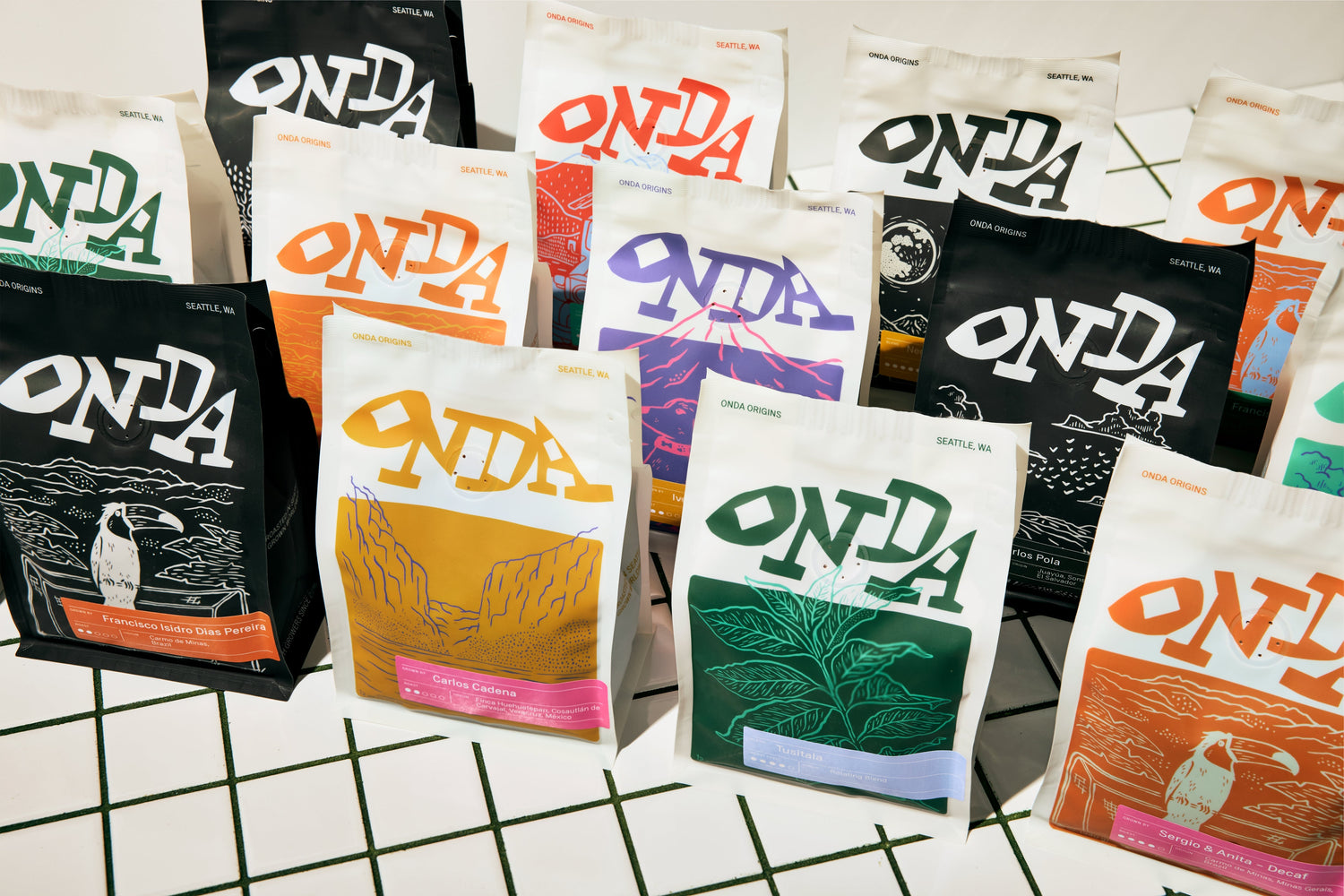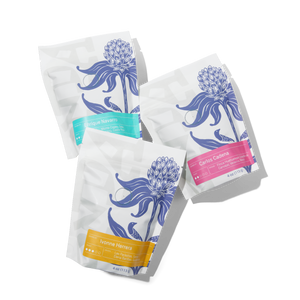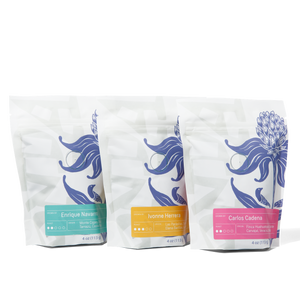Increased Wages and Healthy Practices Inside a Lao Coffee Farm Community
Michael Wood works with Jhai Cooperative of coffee farmers in Laos, which includes the Setapoung families. We jumped on a call with him to hear more about the history of this coffee community and how they’re improving farmer earnings through radical transparency and more sustainable farm practices. Here is an edited transcript of our conversation:
Sustainability Challenges the History of Coffee in Laos
I'll cut back to the original history, right? So, you know, the French colonized Laos and brought coffee here. What happened was in the eighties and nineties, Vietnam was going through a green revolution, they call it Doi moi. It was heavy industrialization of agriculture. You started to see monoculture and aggressive use of fertilizers and whatnot. And those policies got put in place all around the region and specifically Laos because it's a close partner.
So when we arrived, we really found a generation of farmers that have been raised doing pretty much industrial agriculture, specifically monoculture with little tenants of organics that still persist. But the farmers historically were doing rotational farming or slash and burn agriculture.
They were slightly nomadic in the way that they would, grow something for a few years and then shift to a different region. So then there was never really this practice of long term soil sustainability, because it was just never really part of their culture.
So when we came here, we had to start with the basic principles—what is compost and why is that important? And, doing a little bit of soil biology and botany and all these basic concepts to understand what's going on. Farmers are awake. They want to know more about what they're doing. Specifically Mr. Ki who's on the bag of Onda’s Setapoung coffee. He really took a shine to it very early on and started practicing sustainability. He's trying to understand more of what he does as a farmer for himself and for his family.
A huge portion is that his kids learn these kinds of things before they ended up taking over the farm. So it's been interesting. They're more eyes open. They're the more progressive farmers that see value in long term, which is a really hard thing to do in communities that traditionally don't think long term.
Transparency and Traceability Uncovers Lost Earnings for Farmers
Onda signed onto [farmer transparency] right away. They're a perfect partner for this, but in the global coffee trade, I have not really seen traceability like we do.The depth of traceability almost anywhere you go stops at some middlemen. And even if there is traceability on certain value chains that go to a farmer, there's not comprehensive traceability on everything involved with the sale.
So, when Onda buys the green beans from us, there's absolute traceability on how many cents they pay and exactly how much of that goes to the exact producer. But the more critical thing as well is what was lost in the milling process? What kind of defects did the coffee have? Can the defects be broken up and sold to different markets? Did the farmers get back their defects? How much do they get paid for their defects? There's all these other massive parts of the income that are not looked at or not tracked typically in the coffee industry.
And even a lot of people will say the farmer gets paid for their defects, but there's no verification of what the farmer is receiving in their hand. People aren’t lying—It's just—they don't have the data. So they're just like, “the farmers got paid $3,” but when you look at it, the farmer really only got a dollar 25 because there's this management that takes this cut. And then there's this middleman. I instituted transparency in this area, so farmers could start to see where they're being stolen from.
And this actually doesn't make us very popular in the coffee industry. There's a lot of companies that actually don't like to see the dirty side of business.They don't want to know that there's still holes in the system that they have to then deal with because a lot of coffee companies are just in it for the coffee and money.
With us, the people and farmers are the value, the coffee is just the vehicle that we use to direct value to the people. And so we try and flip the whole value chain to where you don't value coffee, you value community more than coffee. You use the coffee to empower the community.
We've been paying to implement this transparency for 10 years. We do it because it's the right thing to do. I've seen a problem and I can't ignore it
Putting the Value of Coffee Defects Back into the Hands of Farmers
An average farmer brings in a ton of coffee. Unless they're doing absolute amazing picking, you'll see anywhere from 25% to 30% of all that [is defective]. Meaning it'll be, it'll most likely be told to the farmer, “We won't pay for that,” but they won't give it back to the farmers.
However, when you're in the processing business, that's actually where most coffee mills make their money. Farmers rarely have the financial ability to have all of the processing equipment themselves. So it's just considered a loss to most farmers.
Here in Laos when we started working with the first group, we were finding that there was about $200,000 to $250,000 worth of defects that was just going poof into the hands of three private individuals. So defects is a really contentious piece that's a super dirty secret of the industry they really don't like farmers to understand.
Coffee Defects Typically Get Heavily Processed and Sold to Instant Coffee Companies Without Paying the Farmers for Them
Defects are valuable and it gets taken away because farmers have no idea. The defects will get sold to places like Nestle or instant coffee factories. Anywhere that makes instant coffee, they take defects. It's called grade X. I mean, it could be insect damage. The beans could be moldy. They could have fermented too long, so they have a lot of actual vinegar in them. It could be that they experienced drought and they're withered up seeds. It could be that a machine broke the bean in half. I could be a genetic defect.
And ultimately for, for the instant market, they're looking for caffeine extraction and a few aromatic profiles that make soluble coffee. They process it heavily and it becomes an extremely valuable product. It has one of the highest profit margins of any coffee product. If you look at it globally, you're talking about billions and billions and billions of dollars, that's legitimately just not communicated to the farmers at all.
When you do the kind of traceability that Setapoung does, farmers learn that. And that becomes dangerous for the middleman companies.
Setapoung Sweetness
In terms of just the coffee itself, Laos has a particular profile. I know it's hard for the world to understand that, cause it's not as prominent as other origins, but Laos coffee in and of itself is inherently very sweet. So Setapoung is really interesting because every year we always get this characteristic strawberry note every year, no matter what. Almost like a candy strawberry cup and it's really quite pleasant.
You can modify it how you roast it. But for me, it's the sweetness and for Setapoung in Laos it's the cleanliness. It's the cleanest cup every year. They pick the best, they dry the best. They put more attention into their coffee than any of the other villages. I commonly say their coffees are as sweet as their community, because they are the sweetest people.
They're always in the best of moods and it's really really pleasant to be around them and work with them. Even with the best specialty prices, farmers don't really thrive, they survive. So, you know, that's one of the problems with coffee in and of itself. Setapoung receives really, really good value for what they do, but they still struggle economically.
Zero-Waste Farming Tripled Farmer Earnings
[The Setapoung Families] have come to really understand there's no such thing as waste. Waste can be transformed. Coffee pulp and “wastewater.” What can we do with that? That's something that we've been training for years here is how to take coffee pulp and turn it into an animal feed. You can't feed it directly. You have to ferment it with lactobacillus and we can raise animals which diversifies their income even more. Normally when you raise an animal, 80% of the cost is the feed.
Things that would normally be looked at as waste, we turn that into high protein feeds for animals and all of a sudden they're raising animals with no feed cost. And when they do that, then there's massive, massive earning potential in raising animals.
And then the manure, we feed to the insects—it's this little black soldier fly. And the black soldier fly is an amazing feed for fish. For chickens. And then the animals partnered with the insects produce compost for the farm. So we balanced the number of animals that are needed to support one hectare of coffee production. And then we close this loop so that you know what you produce supports what you feed and what you feed supports what goes back to your farm.
So it's this closed loop waste transformation system that we put into place and the Setapoung farmers are tripling their income—because it's organic animals that are going to the market and having almost no costs.
Independence for Farmers Through Their Land and Knowledge
Laos is an ethnic minority hotbed. We have eight ethnic minority groups that have been here for thousands of years before Laos existed. It's this whole range of indigenous peoples that have resisted the different kingdoms or different nation states that have risen up and you can see them starting to struggle with this dependence on “state.”
They would like to have a little bit more independence. Through and what they've always understood—their soil, their land. Because again, these communities were originally animist as well. So I see a community that wants to get its roots back to the soil, into the plants.
Some of the farmers in Setapoung want to support their children through university, through college. There's a couple of kids that want to go and study agriculture, but there's a couple that really want to study psychology because they want to understand why people think the way they're thinking.
Knowledge is everything. I mean, we could just sit here and pay high wages all day long, but nothing will change. The difference is when the farmers really start to understand what they're doing. When they really truly understand that they're connecting with Onda when Onda is here when Scott's meeting the farmers and they see that there is something outside of Laos.
The internet for the Laos language is almost nonexistent. And these are critical skills that they should understand as coffee producers, but even independently on their own. They just can't find it.So there's a huge information barrier just based on the language. At the top we've had to fight multiple levels of management that have come and gone and have tried to steal or have stolen from them and we'd have to rebuild the structure from the bottom up.
[Farmers] know that there's value in the system and it's beyond the money. It's them being able to determine for themselves, what are they going to do with their crop. It's their crop. It's not the middleman, it's their market. They built these trade lines with the United States. They built these trade lines with Europe and they're theirs. They're not anybody else's, you know, that's something that they have to protect for their children because they're most likely still going to be farming.
They're trying to build something for themselves, but the implication is that it would help millions of other farmers if they can break past 500 years of colonization and systemization of basically the slave trade of commodity goods.
The coffee industry is founded on the same principles as 600 years ago. It was spread around the planet on slavery, the kinds of lack of access to knowledge and machinery and capital. it's a systemic thing. It's not that everybody’s really bad. [The coffee industry] is just structured very horribly and if these farmers can really bridge the gap with consumers and with markets and convey that people are the important thing here… if they can do something like that...that would be why I'm here. The coffee is a celebration of our relationship. Not the other way around.
Buy Coffee from the Setapoung Families / Laos




